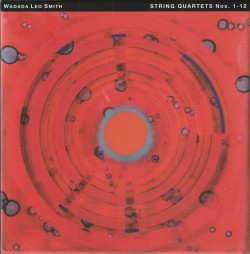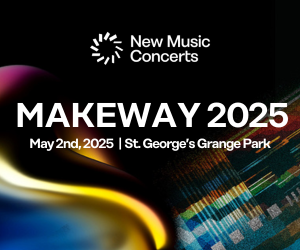 Wadada Leo Smith – String Quartets 1-12
Wadada Leo Smith – String Quartets 1-12
RedKoral Quartet
TUM Records TUM BOX 005 (tumrecords.com)
The composer and trumpeter Wadada Leo Smith is – together with Anthony Braxton, Muhal Richard Abrams, George Lewis, Roscoe Mitchell and others of the Association for the Advancement of Creative Musicians (AACM) – a composer in the revolutionary vein of Igor Stravinsky. He (Smith) is one of the mighty propellers of the musical continuum. So what does that have to with this critique?
Let’s pretend we are watching an excerpt from Wolf Koenig’s 1965 documentary and we are now at the part where Koenig asks Stravinsky: “Who created music?” Restless with excitement Stravinsky, says: “God did.” Then he adds: “I think … Even not think… I am sure… with the creation there was just a BIG sound of drum and cymbals… and that the creation of music.” Spinning on that vibrant, rhythmic axis of creation is the continuum of music,
I believe that somewhere in their hearts, more than anyone else, Wadada Leo Smith appears to have somehow been privy to that exact moment of Creation. This is why his music has its origins in the Ankh (the Egyptian symbol of Life), the root of Smith’s conception – his Ankhrasmation. It is out of this singular taproot that Smith’s music swirls in an elegant ellipsis, in the musical continuum.
Indeed Smith’s music seems to say that the tradition (that propels this continuum) is a wonderful reality, but not understanding that the inner dynamic of tradition is always to innovate, is a prison. Since his first acknowledged works on TUM Records, A Love Sonnet for Billie Holiday, The Chicago Symphonies and, now the epic collection – his String Quartets Nos.1-12 in this lavishly produced (even by TUM standards) set, Smith has once again chiselled his uniquely beautiful, but defiantly provocative, body of work from out of the bedrock of what square-eyed distributors like to call the Jazz and the European Classical traditions.
But while that might imply a pastiche of archetypal Black American-and-Western European models, such as symphonies, sonnets and string quartets, instead even while using the European terminology almost sardonically, (on The Chicago Symphonies) and certainly on these string quartets, Smith forces his listeners to reconsider what tradition really is.
In String Quartets Nos.1-12, Smith positions himself in creative conflict with age-old protocols about how string quartets “ought” to work. By actively throwing overboard melodic, structural and harmonic hooks that have been expressively blunted through overuse, he builds from what might – or might not – be left. Smith, as both composer and performer, shows himself to be instinctively radical. The irresistible force of his work pulls in its wake with the RedKoral Quartet, harpist Alison Björkedal (String Quartet No 4), fellow Pulitzer Prize-winning pianist Anthony Davis (String Quartet No.6), percussionist Lynn Vartan (String Quartet No.6), guitarist Stuart Fox (String Quartet No.7) and Thomas Buckner (voice on String Quartet No.8).
Together, the performers find themselves puréeing classical music’s sublime melodic and harmonic gestures into motor rhythms, volatile white noise and the most compelling absurdist theatrics as they wrench their instruments apart and journey through the musical debris. The music elevates the spirit of famous black men (Ulysses Simpson Kay, Thomas Jefferson Anderson, Jr., Hale Smith and George Theophilus Walker in String Quartet No 1, Haki R. Madhubuti in String Quartet No 5, Indigenous Peruvian heroes in String Quartet No. 7, Ma Rainey and Marion Anderson in String Quartet No.9, Louis Armstrong in String Quartet No.11… and so on.
In this music, definitions of beauty – Smith’s Black American definitions of beauty – are central to his artistic credo in these iconic works. But the composer – with Ankhrasmation gestures of thought and musical action – argues that his music and the artists performing it must make the distinction between overly perfumed, audience-ingratiating beauty typical of commercial music – which he regards as disturbingly manipulative – and “authentic” beauty, as naturally evocative as God, the Master Creator intended it to be.
This landmark 7-CD release marks the conclusion of a celebration of the 80th anniversary of Wadada Leo Smith’s birth. The collection lands smack dab onto the earth’s musical map as a proverbial masterpiece of modernist music. Smith shepherds the crack musicians of the RedKoral Quartet and celebrated guests through an epic sojourn of his uncompromising soundworld. If the sounds that Smith hears in his inner ear move off the radar of conventional instrumental timbre, the RedKoral, who have worked extensively with him over the past decade, and other musicians unerringly zone into his musical intentions, realizing his ideas to perfection.



